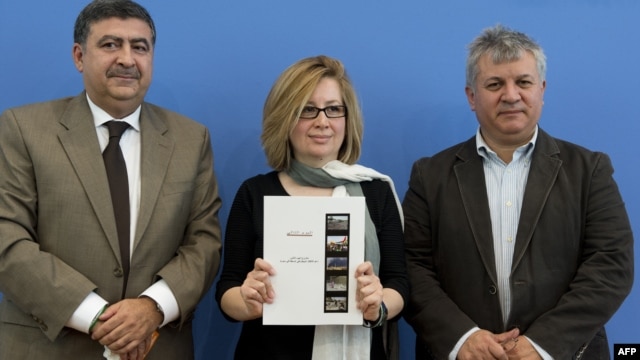Voice of America - Syrians Plan Next Government without Assads#VOA #Syria http://itwitex.com/!17h3d4
7:50 PM - 29 Aug 12 · Details
Syrians Plan Next Government without Assads
(From L) Members of the opposition Syrian National Council Murhaf Jouejati, Afra Jalabi, and member of the opposition National Change Currents Amr Al-Azm following a press conference in Berlin, August 28, 2012.
While many around the world wait for Syrian President Bashar al-Assad’s regime to fall, a few dozen Syrians have been meeting privately for six months trying to figure out what comes next.
The 45 Syrians – mostly exiled politicians and some activists fresh off the streets of their nation’s 18-month uprising - have been meeting quietly in Berlin to recommend how a transitional government could rebuild government institutions and establish democratic practices unseen in the country for more than four decades.
The results of their work are contained in The Day After: Supporting a Democratic Transition in Syria, a 120-page document that was released to the public today in Berlin.
However, the larger questions remains who can implement their recommendations.
“The fact is, we don’t know,” said Andrew Tabler, a senior research fellow from the Washington Institute for Near East Policy who spoke from Antakya, a Turkish city on the Syrian border. “That’s why there is such an effort now to reach out to the opposition, especially inside the country to see if we can work better with it.”
Looking for new leadership inside Syria
The Syrians meeting in Berlin are not the only ones trying to map out a future transitional government in Damascus. So are the Arab League, the so-called Friends of Syria alliance and other regional and western powers, including the U.S. State Department and Pentagon.
The 45 Syrians – mostly exiled politicians and some activists fresh off the streets of their nation’s 18-month uprising - have been meeting quietly in Berlin to recommend how a transitional government could rebuild government institutions and establish democratic practices unseen in the country for more than four decades.
The results of their work are contained in The Day After: Supporting a Democratic Transition in Syria, a 120-page document that was released to the public today in Berlin.
However, the larger questions remains who can implement their recommendations.
“The fact is, we don’t know,” said Andrew Tabler, a senior research fellow from the Washington Institute for Near East Policy who spoke from Antakya, a Turkish city on the Syrian border. “That’s why there is such an effort now to reach out to the opposition, especially inside the country to see if we can work better with it.”
Looking for new leadership inside Syria
The Syrians meeting in Berlin are not the only ones trying to map out a future transitional government in Damascus. So are the Arab League, the so-called Friends of Syria alliance and other regional and western powers, including the U.S. State Department and Pentagon.


